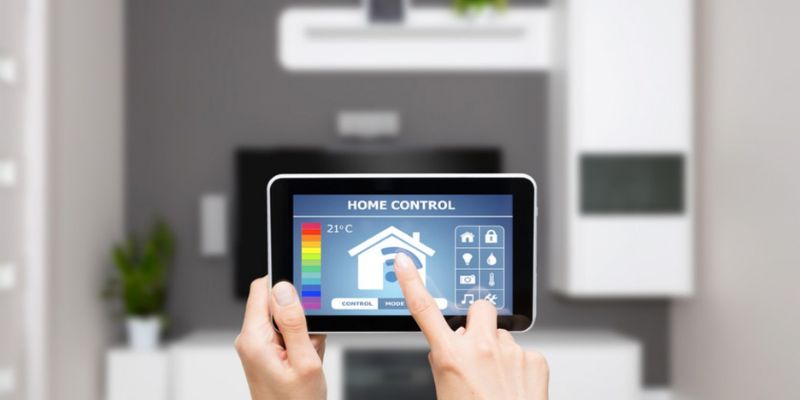In today’s fast-paced and interconnected world, smart home technology has become increasingly popular. People are looking for ways to make their lives more convenient and efficient, and controlling smart home devices remotely is a major part of that. With just a few taps on your smartphone or a voice command, With just a few taps or a voice command, you can turn on the lights, adjust the thermostat, and even lock your doors. Yet, precisely how are savvy home gadgets controlled from a good ways controlled? In this comprehensive guide, we will go over “Can I control my smart home devices remotely?”, including the benefits, the technology involved, and the setup steps. Let’s get started, then!
Can I control my smart home devices remotely?
The following are among the benefits:
- Convenience: Using a remote control, you can easily manage your smart home devices from anywhere. Whether you’re at work, on vacation, or just relaxing on the couch, you have complete control over how your home looks.
- Energy Efficiency: Remote control allows you to optimize energy usage by adjusting the settings of your smart home devices even when you’re away. You can turn off lights and appliances remotely, ensuring they are not left on unnecessarily.
- Increased Security: By remotely monitoring and controlling your smart home security systems, such as cameras and door locks, you can enhance the security of your home. You can check in on your property and take necessary actions if any suspicious activity is detected.
- Customization and Personalization: Remote control provides you with the flexibility to customize and personalize your smart home devices to suit your preferences. You can create schedules, set routines, and control multiple devices simultaneously with ease.
Now that we understand the benefits, let’s explore how you can control your smart home devices remotely.
Setting Up Remote Control for Your Smart Home Devices
To control your smart home devices remotely, you need to follow a few simple steps. Here’s a step-by-step guide:
- Choose Compatible Smart Home Devices: Before diving into remote control, ensure that your smart home devices are compatible with remote access. Most modern smart devices offer remote control capabilities, but it’s always a good idea to check the manufacturer’s specifications.
- Connect to a Reliable Internet Connection: A stable and secure internet connection is crucial for remote control. Ensure that your smart home devices are connected to a reliable Wi-Fi network. A strong signal strength will ensure smooth communication between your devices and your smartphone or other remote control devices.
- Download and Install the Manufacturer’s App: Smart home device manufacturers typically provide dedicated apps for remote control. Visit your device manufacturer’s website or app store to download and install the app compatible with your devices.
- Create User Accounts and Log In: Once you have installed the app, create a user account and log in. This step may vary depending on the manufacturer and the app you are using.
- Pair and Sync Your Devices: Follow the instructions provided by the manufacturer to pair and sync your smart home devices with the app. This step typically involves scanning QR codes or entering unique device identification numbers.
- Test Remote Control Functionality: After pairing your devices, test the remote control functionality within the app. Ensure that you can control your devices successfully and that they respond accordingly.
- Explore Advanced Features: Many smart home devices offer advanced features such as voice control, automation, and integration with virtual assistants like Amazon Alexa or Google Assistant. Take the time to explore these features to maximize the benefits of remote control.
Frequently Asked Questions (FAQs)
FAQ 1: Can I control my smart home devices remotely from multiple devices?
Yes, most smart home device apps allow you to log in and control your devices from multiple smartphones, tablets, or computers. Simply download the app on the additional devices, log in using the same account credentials, and you’ll have remote control access from all your devices.
FAQ 2: Are there any security risks involved in remote controlling smart home devices?
While remote control brings convenience, it’s important to ensure the security of your smart home devices. Here are some best practices to minimize security risks:
- Use strong and unique passwords for your user accounts.
- Keep your devices’ firmware and app software up to date.
- Enable two-factor authentication if supported.
- Secure your Wi-Fi network with a strong password.
- Avoid sharing your account credentials with others.
FAQ 3: Can I control my smart home devices remotely without an internet connection?
No, remote control of smart home devices relies on an internet connection. Without an internet connection, you won’t be able to communicate with your devices remotely. It’s essential to have a stable and reliable internet connection for seamless remote control.
FAQ 4: What if I lose my smartphone or it gets stolen? Can someone else control my smart home devices remotely?
Most smart home device apps require you to log in with your user credentials to gain access to remote control. If you lose your smartphone or it gets stolen, immediately change your account password to prevent unauthorized access. Additionally, contact your device manufacturer’s customer support for further assistance.
FAQ 5: Can I control devices from different manufacturers using a single app?
In some cases, yes. Certain smart home device apps support the integration of devices from various manufacturers. However, it’s important to check compatibility and supported integrations in the app’s documentation or reach out to the manufacturer for clarification.
FAQ 6: What are the alternatives to smartphone apps for remote control?
Apart from smartphone apps, there are alternative methods for remote control, including:
- Voice Control: Smart speakers or virtual assistants like Amazon Alexa or Google Assistant can be used to control your smart home devices remotely through voice commands.
- Web Interfaces: Some smart home devices provide web interfaces that allow you to access and control them remotely through a web browser on a computer or tablet.
Conclusion
Controlling your smart home devices remotely offers unparalleled convenience, energy efficiency, security, and personalization. By following the simple steps outlined in this guide, you can set up remote control for your smart home devices and unlock a world of possibilities.
Remember to prioritize security and keep your devices updated to ensure a safe and enjoyable smart home experience. So, go ahead and take control of your smart home from anywhere, at any time!

